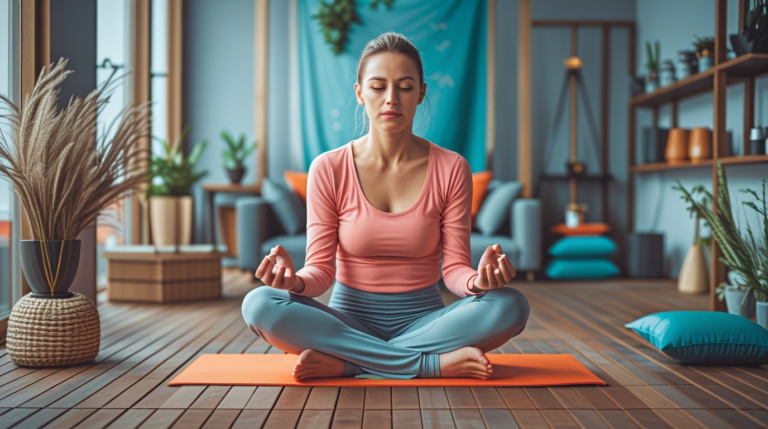Stress is an inevitable part of life. Whether it stems from work, relationships, or personal challenges, effective stress management is crucial for our mental and physical well-being. If you’re searching for ways to combat stress and enhance your overall wellness, this article is tailored just for you. We’ll introduce you to 10 effective stress relief techniques that you can try today, designed to fit seamlessly into your daily routine. These techniques can help you regain control, feel centered, and improve your quality of life.
Mindful Meditation
Mindful meditation is a powerful technique that can significantly lower stress levels. Mindfulness involves focusing your attention on the present moment, without judgment. This practice encourages you to observe your thoughts and feelings without trying to control them.
By dedicating just 10-15 minutes a day to mindful meditation, you can experience a profound relief from stress. To get started, find a quiet place to sit comfortably, close your eyes, and focus on your breathing. Whenever your mind starts to wander, gently bring your focus back to your breath.
Benefits of Mindful Meditation
- Reduces stress and anxiety
- Enhances self-awareness
- Improves emotional health
Physical Exercise
Exercise is one of the most effective stress relief techniques. Physical activity helps to reduce stress hormones and stimulate the production of endorphins, also known as the body’s natural painkillers. Whether you opt for a brisk walk, a vigorous run, or a calming yoga session, any form of exercise can be beneficial.
Regular physical activity not only helps to alleviate stress but also promotes improved mood, better sleep, and increased energy levels. Remember, even moderate activities such as gardening or dancing can contribute significantly to stress reduction.
Types of Physical Exercise for Stress Relief
- Yoga and pilates
- Aerobic exercises
- Strength training
Deep Breathing Techniques
One of the simplest ways to relieve stress is through deep breathing exercises. Taking deep, slow breaths can activate the body’s relaxation response, reducing heart rate and blood pressure.
To practice deep breathing, sit or lie down in a comfortable position. Inhale slowly through your nose, allowing your chest and lower belly to rise. Hold your breath for a moment, then exhale slowly through your mouth. By practicing this technique regularly, you can quickly alleviate stress and promote a sense of calm.
Why Deep Breathing Works
- Activates the body’s natural relaxation response
- Reduces stress hormones
- Promotes oxygen-rich blood flow
Progressive Muscle Relaxation
Progressive muscle relaxation (PMR) is a method that involves tensing and then slowly releasing each muscle group in the body. This technique can help reduce physical tension resulting from stress and improve your overall sense of well-being.
Start by lying down in a quiet place, then work through each muscle group, beginning at your toes and moving up to your head. Tense each muscle group for a few seconds, then release it. This practice can be integrated into your daily routine to help you unwind and manage stress more effectively.
Steps in Progressive Muscle Relaxation
- Tense and relax each muscle group
- Focus on the release of tension
- Repeat regularly for best results
Journaling
Writing about your thoughts and feelings in a journal can be a cathartic way to process stress and emotions. Journaling allows you to reflect on your experiences, understand your stress triggers, and develop strategies to cope more effectively.
Set aside a few minutes each day to jot down your thoughts, or use prompts to explore deeper emotions. Over time, journaling can help you gain insight into your mental state and alleviate the feelings of stress.
How to Start Journaling
- Set a routine and stick to it
- Write freely without censorship
- Reflect on your entries to gain insights
Aromatherapy
Aromatherapy utilizes natural essences from plants to promote health and well-being. It’s an effective way to reduce stress and enhance your mood. Essential oils like lavender, chamomile, and peppermint are known for their calming and relaxing properties.
To use aromatherapy for stress relief, you can diffuse essential oils in your home, add a few drops to a warm bath, or apply them to your skin (diluted with a carrier oil). This sensory experience can provide a comforting and soothing break from the chaos of daily life.
Benefits of Aromatherapy
- Reduces stress and anxiety
- Improves sleep quality
- Boosts mood and relaxation
Healthy Diet
A well-balanced diet plays a crucial role in managing stress. Consuming healthy, nutrient-rich foods provides your body with the energy it needs to cope with stress. Maintain a diet that includes a variety of fruits, vegetables, lean proteins, and whole grains.
Avoid excessive caffeine and sugar, as these can increase stress and cause energy crashes. Instead, opt for stress-busting foods like fatty fish, nuts, seeds, and dark chocolate in moderation to help stabilize your mood.
Top Foods to Combat Stress
- Leafy greens such as spinach
- Berries, especially blueberries
- Avocados and nuts
Listening to Music
Music has a powerful effect on our emotions and can be an excellent tool for stress relief. Listening to soothing music can lower anxiety levels and promote relaxation.
Create a playlist of your favorite calming or uplifting tunes and let them work their magic. Whether it’s classical, jazz, or ambient sounds, music can set the mood and help you unwind.
Music for Stress Reduction
- Classical and instrumental music
- Nature sounds and white noise
- Your favorite calming genres
Sleep Hygiene
Quality sleep is essential for managing stress and maintaining overall wellness. Poor sleep can increase stress levels, making it crucial to prioritize good sleep hygiene.
Establish a relaxing nighttime routine, keep your bedroom environment restful, and avoid screens before bed. By fostering good sleep habits, you can improve your resilience to stress.
Tips for Better Sleep
- Maintain a consistent sleep schedule
- Create a calming bedtime routine
- Limit caffeine and screen time before bed
Social Connection
Human connection is a powerful antidote to stress. Interacting with friends, family, and loved ones can provide emotional support and strengthen your stress resilience. Sometimes, talking through your challenges with someone you trust can lighten your emotional load.
Consider joining a club, participating in community events, or volunteering to increase your social interactions. By building a supportive network, you can better navigate life’s stressors.
Ways to Enhance Social Connections
- Attend social gatherings and events
- Reach out to friends and family regularly
- Join clubs or groups with shared interests
In conclusion, integrating these 10 stress relief techniques into your daily routine can lead to a more balanced and peaceful life. Remember, the key to effective stress management is consistency and mindfulness in your approach.
For more tips on maintaining wellness, check out our posts on The Benefits of Yoga for Stress Relief and Healthy Eating for a Calm Mind. We encourage you to try these techniques and share your experiences with us. Leave a comment below, share this post with others, or subscribe for more wellness insights!





Leave a Comment